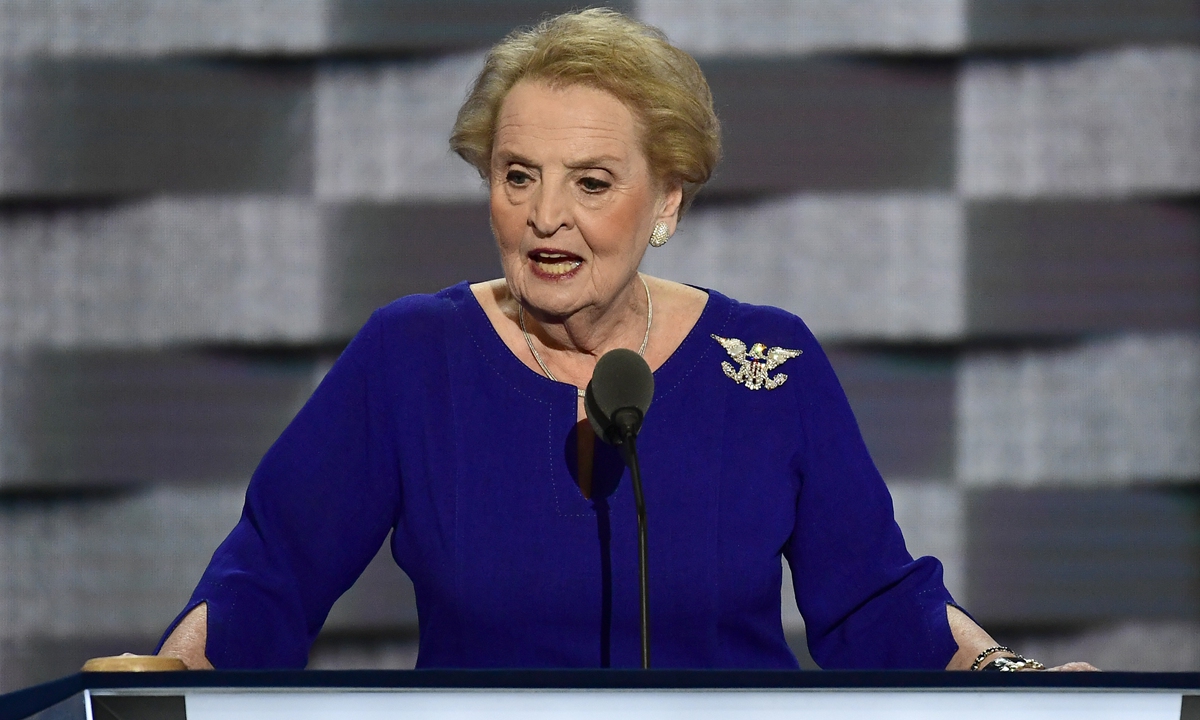Late Albright’s views on China reflect contradictory attitudes of US politicians: experts

Madeleine Albright Photo:VCG
Madeleine Albright, the first female US secretary of state, died of cancer at the age of 84, her family said in a statement on Wednesday. Experts said that Albright's views on China reflected the contradictory attitudes of many US politicians, seeing economic benefits in working with China but holding hostility from a strategic point of view.
"Madeleine Albright was a force. Hers were the hands that turned the tide of history," US President Joe Biden said in a statement paying tribute to Albright on Wednesday, adding that "America had no more committed champion of democracy and human rights than Secretary Albright."
She was a central figure in US President Bill Clinton's administration, first serving as US ambassador to the United Nations before becoming US' top diplomat.
Known for her "hawkishness" in foreign policy, Albright championed the expansion of NATO to the former Soviet states and was crucial in pushing Clinton to militarily intervene in Kosovo in 1999. During her tenure, the US bombed Yugoslavia, when five US guided missiles bombed the Chinese Embassy in Belgrade, killing three Chinese journalists and outraging the Chinese public.
Replying to a question on how Iraq had been suffering from the sanctions placed on the country following 1991's Gulf War, Albright once said in an interview that the death of 500,000 Iraqi children was "a very hard choice, but the price - we think the price is worth it."
Experts said while Albright's hawkishness in Europe resulted from her ideological bias of Russia, which dates back to her childhood experience when she immigrated with her family to the US from Czechoslovakia, she had very different attitudes in dealing with China.
"While Albright tried to shape countries in the post-Soviet region into those that suit the West's interests and taste, she emphasized balanced and stable relations between China and the US, calling for more cooperation and communications from a realistic perspective," Diao Daming, associate professor at the Renmin University of China in Beijing, told the Global Times on Thursday.
At that time, China wasn't seen by the US as a challenger or a competitor, said Diao, "given China's sustained development in trade and economy, proper interaction with China means not only economic benefits for the US, but also a reflection of the US leadership in Asia-Pacific region."
Albright visited China five times. In a previous exclusive interview with the Global Times in 2016, she said that "the US-China relationship is the most important relationship of the 21st century. It is a relationship that has many facets…not everything was resolved in terms of currencies, negative lists and all that."
Talking with Australian Broadcasting Corporation in 2020, she urged countries to not become divided in the fight against coronavirus, and cooperate during the rebuilding that will follow, including with China.
However, she also said on another occasion that the US should attach prudent limits to its economic reliance on China and to the sharing of technologies. "Above all, we should strive to speak with a common voice," Financial Review Magazine reported.
Experts said that Albright's view on China reflected the contradictory attitudes of many US politicians: they see economic benefits and opportunity in working with China but hold hostility from a strategic point of view.
Lü Xiang, a research fellow at the Chinese Academy of Social Sciences, told the Global Times on Thursday that during Albright's term, she knew that China's rapid growing economy would bring the US unprecedented development, evident in the US rapid economic growth in the late 1990s. But at the same time, she also wanted to see a 'color revolutions' in China."
